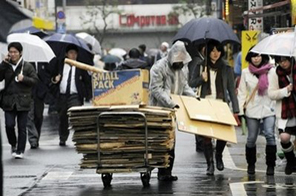Japanese unemployment hits six-year high
TOKYO: Japan's jobless rate hit a six-year high of 5.4 percent in June and deflation deepened as Asia's biggest economy wrestled with the fallout from its worst recession in decades, data showed Friday.
Reeling from plunging profits, Japanese companies shed thousands more workers, putting the unemployment rate on course to rise above its post-World War II high of 5.5 percent, last seen in April 2003.
The jobless rate will probably climb above 6.0 percent early next year, said Hiroshi Shiraishi, an economist at BNP Paribas.
"A lot of large corporations have been holding off slashing regular workers. But as it becomes clear that sales aren't going to recover much they will eventually have to start more aggressive restructuring," he said.
Hopes are mounting that Japan's economy has come through the worst of its export and production slump, but unemployment tends to lag behind economic growth in recovering from a recession.
The number of people out of work in June increased by 830,000, or 31.3 percent, from a year earlier to 3.48 million, lifting the jobless rate by 0.2 points from May when it stood at 5.2 percent, the government said.
There were only 43 job offers for every 100 job seekers, a record low and down from 44 the previous month.
Despite the worsening jobs market, Japanese household spending edged up 0.2 percent in June from a year earlier, adjusted for price changes.
Deflation deepened with core consumer prices falling a record 1.7 percent in June from a year ago.
Core prices, which exclude those of volatile fresh food, fell for the fourth straight month after a 1.1 percent drop in May.
"Deflation's establishing more of a foothold," said Jan Lambregts, head of research at Rabobank Global Financial Markets in Hong Kong.
Japan was stuck in a deflationary spiral for years after its asset price bubble burst in the early 1990s, prompting consumers to put off purchases in the hope of further price drops and reducing corporate earnings.
Analysts say that the current price falls reflect the effects of falling energy costs -- good news for the economy -- and weak domestic demand, which is more of a worry.
Japan plunged into recession more than a year ago as a severe global downturn crushed demand for its cars, electronics and other exports.
The economy shrank at an annualised pace of 14.2 percent in the first quarter of 2009, the worst performance on record, but recent data have indicated that exports and industrial production have begun to rebound.
Japan's factory output soared 8.3 percent in April-June from the previous quarter, the sharpest rise since 1953, following a record slump of 22.1 percent in the first three months of the year, the government said Thursday.
All of which suggests "that the Japanese economy returned to growth last quarter," said Julian Jessop, chief international economist at the research firm Capital Economics in London.
Japan will "almost certainly" record the strongest growth of the Group of Seven major economies for the second quarter of 2009, he wrote in a note.
But analysts also warn that any recovery could fizzle out next year once the positive effects of government stimulus spending measures fade, with rising unemployment and a shrinking population likely to weigh on consumer spending.






